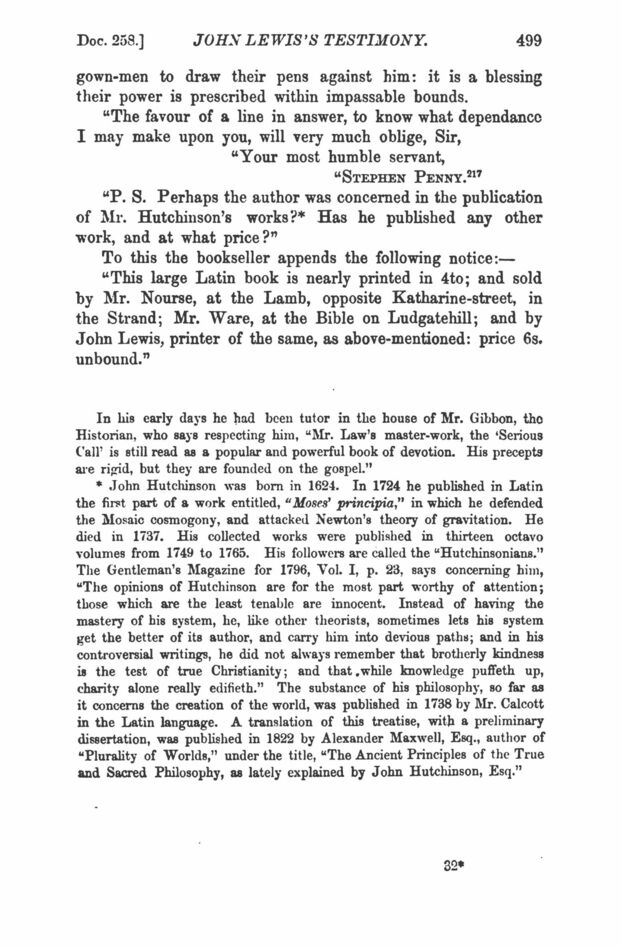
Full resolution (JPEG) - On this page / på denna sida - Sidor ...

<< prev. page << föreg. sida << >> nästa sida >> next page >>
Below is the raw OCR text
from the above scanned image.
Do you see an error? Proofread the page now!
Här nedan syns maskintolkade texten från faksimilbilden ovan.
Ser du något fel? Korrekturläs sidan nu!
This page has never been proofread. / Denna sida har aldrig korrekturlästs.
Doc. 258.] 499
JOHN LEWIS’S TESTIMONY.
gown-men to draw their pens against him: it is a blessing
their power is prescribed within impassable bounds.
"The favour of a line in answer, to know what dependance
I may make upon you, will very much oblige, Sir,
"Your most humble servant,
"STEPHEN PENNY.217
"P. S. Perhaps the author was concerned in the publication
of Mr. Hutchinson’s works ?* Has he published any other
work, and at what price ?"
To this the bookseller appends the following notice :
"This large Latin book is nearly printed in 4to ; and sold
by Mr. Nourse, at the Lamb, opposite Katharine-street, in
the Strand ; Mr. Ware, at the Bible on Ludgatehill ; and by
John Lewis, printer of the same, as above-mentioned : price 6s.
unbound."
In his early days he had been tutor in the house of Mr. Gibbon, the
Historian, who says respecting him, "Mr. Law’s master-work, the ’ Serious
Call’ is still read as a popular and powerful book of devotion. His precepts
are rigid, but they are founded on the gospel."
* John Hutchinson was born in 1624. In 1724 he published in Latin
the first part of a work entitled, “ Moses’ principia," in which he defended
the Mosaic cosmogony, and attacked Newton’s theory of gravitation. He
died in 1737. His collected works were published in thirteen octavo
volumes from 1749 to 1765. His followers are called the "Hutchinsonians."
The Gentleman’s Magazine for 1796, Vol. I, p. 23, says concerning him,
"The opinions of Hutchinson are for the most part worthy of attention ;
those which are the least tenable are innocent. Instead of having the
mastery of his system, he, like other theorists, sometimes lets his system
get the better of its author, and carry him into devious paths; and in his
controversial writings, he did not always remember that brotherly kindness
is the test of true Christianity; and that ,while knowledge puffeth up,
charity alone really edifieth." The substance of his philosophy, so far as
it concerns the creation of the world, was published in 1738 by Mr. Calcott
in the Latin language. A translation of this treatise, with a preliminary
dissertation, was published in 1822 by Alexander Maxwell, Esq., author of
"Plurality of Worlds," under the title, "The Ancient Principles of the True
and Sacred Philosophy, as lately explained by John Hutchinson, Esq."
32*
<< prev. page << föreg. sida << >> nästa sida >> next page >>